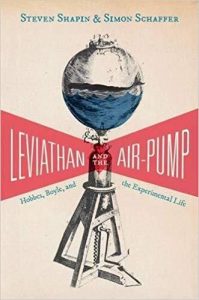
Leviathan and the Air-Pump, is about the debate between English scientist, Robert Boyle, and English philosopher Thomas Hobbes on the validity of experiments on vacuum using a device called air-pump that was developed to create ‘vacuum’.
The air-pump was called the ‘cyclotron’ of the 17th century’ and was sort of ‘big science’ of the period. In fact, this was the time when the word science was not in currency. What was the prevalent term was the term ‘natural philosophy’, a discipline of philosophy dealing with the subject matter of the later years physics.
This was arguably the first sort of attempt in using ‘experiments’ to settle ‘disputes’ and create ‘facts’. In many ways it was the origin of ‘experimentation’ as legitimate means of producing ‘knowledge’ . Many authors also consider this as crucial interjection that created what we now term as the body of knowledge called ‘Science’.
Thomas Hobbes was a very influential philosopher of his times. He is the first of the modern thinkers who introduced the term ‘social contract’ as the basis of human society, laws and government. His book ‘Leviathan’ put forth his views on the ‘theory of social contract’.
According to him, human beings in the state of nature are ‘solitary, poor, brutish, short-lived and miserable’ . They do not have independent existence. If they chose to live alone there lives will be miserable and short lived. Further, they fight with each other and die young. He stated that in the ‘state of nature’, people will be in a state of war with one and all (“bellum omnium contra omnes”). To avoid the conflicts and chaos, Hobbes said, human beings submit certain part if their unlimited freedom to the state, so that the state ensures that ‘rule of law’ is prevailed and people do not fight with each other.
Hobbes stated that this is the basis of government and laws. He further stated that for the citizen to behave properly, the ruler should be like ‘Leviathan’, an all powerful sea-monster referred in Bible. Because of the power and invincibility of the Kind, people would submit to the sovereign and there would be social order, and peace. Hobbes book ‘Leviathan’ was quite famous in that time, because this was a time immediately after English civil war when a bunch of conspirators had dethroned the king and had ever since engaged in internecine feuds. The period of Boyle-Hobbes debate was during the English Restoration where the monarch was restored and there apparently was a respite from the civil war.
Hobbes maintained that the purpose of philosophy was to identify principles of restoring social order and thereby peace. To ensure social order, Hobbes believed that there need to certainty of knowledge. There should not be different group of people claiming different privileges of ‘private knowledge’.
When experimentators under the leadership of Robert Boyle started to advance their procedure in the Royal society, Thomas Hobbes questioned the ability of ‘experiments’ for generating undisputable knowledge. The LAP is a case study on this debate between Robert Boyle and Thomas Hobbes.
The authors take as ‘stranger’s perspective’ in dealing with the Boyle-Hobbes debate.
While it is well know that Boyle’s methods finally won the test of time, and is considered as the setting for the origin of modern day science, Shapin and Schaffer do not consider the advantage of hindsight in the analysis of the Boyle-Hobbes debate. They describe the debate from the perspective of a stranger who is unware of the final outcome of Boyle’s methods. In the process, they consider in detail the critique of Hobbes and discuss it from the perspective of the 17thcentury England and Europe.
The book is a difficult one to read in one go. It requires some time and introspection. The concepts has to be recrystallized, notes have to made and a lot of sections of the book has to be skipped to made the book a ‘comprehensible read’.
I was interested in the book as it traces the origin of methods ‘science’ as we call it in modern era. The Boyle-Hobbes conversation shines light to intricacies that took to the ‘birth of science’. The book is a difficult read, but worth investment for those who are interested in the pangs of origin of modern science.
I am recommending this book for those who are genuinely interested in the foundational sociology of modern science. As I draw a lot of my understanding from this book, I place this in SV’s display shelf.
Hits: 335

